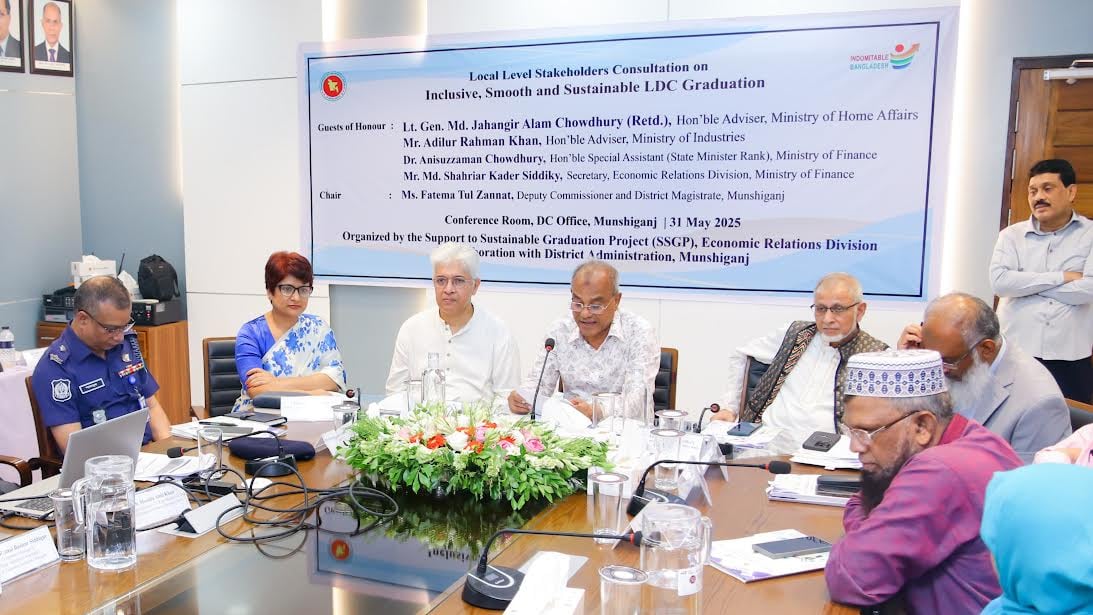News Flash
News Flash

DHAKA, May 31, 2025 (BSS) – Home Affairs and Agriculture Adviser Jahangir Alam Chowdhury today said Bangladesh’s agro-based industries should be more export-oriented to prepare the sector to face post-LDC graduation challenges.
Jahangir Alam said this at a workshop titled- Local Level Stakeholders Consultation on Inclusive, Smooth and Sustainable LDC Graduation in Munshiganj here today.
Support to Sustainable Graduation Project (SSGP) of the Economic Relations Division (ERD) organized the workshop in collaboration with the Munshiganj district administration at Deputy Commissioner’s Conference Room.
Industries Adviser Adilur Rahman Khan, Special Assistant to the Chief Adviser Dr. Anisuzzaman Chowdhury and ERD Secretary Shahriar Kader Siddiky also attended the workshop as guests.
Deputy Commissioner of Munshiganj Fatema Tul Jannat was in the chair while SSGP Project Director AHM Jahangir delivered the welcome speech.
Priority should be given on good governance for preparing the country for post-graduation challenges, Jahangir Alam said.
Industries Adviser Adilur Rahman Khan said Munshiganj has all the potentials to become a major hub for small and medium enterprises.
Focusing on the development experience of East and South-East Asian countries, Special Assistant to the Chief Adviser Dr. Anisuzzaman Chowdhury stressed on national unity and solidarity for achieving the long-term national goals.
ERD Secretary Shahriar Kader Siddiky emphasized on active initiatives from the private sector along with the government in meeting the challenges of LDC graduation. He also observed that there are scopes for setting up a biotechnology village in Munshiganj.
Former Additional Secretary to the government and Component Manager of SSGP Dr. Rezaul Bashar delivered a presentation providing an overview of LDC Graduation process and its implications.
Former Member of Bangladesh Trade and Tariff Commission and Component Manager of SSGP Dr. Mostafa Abid Khan delivered a presentation on “Strategies for Smooth and Sustainable Graduation, and the Role of Local Level Stakeholders.”
International Trade Expert of SSGP Nesar Ahmed, Principal of Govt. Haraganga College Professor Nazmun Nahar, ADC (Education and ICT) of Munshiganj Mahmudur Rahman Khondoker, founder of Yunus Khan Memorial College Faridur Rahman Khan and President of Munshiganj Press Club Bachiruddin Jewel spoke on the occasion.
Speakers at the workshop observed that there are huge potentials for developing agro-processing and tourism industries in Munshiganj.
In this context, they called for infrastructure development, expansion of transport networks, ensuring the supply of gas and electricity in factories and skill enhancement of the local youth.
It is notable that Bangladesh met all the criteria for graduation from the LDC status during the triennial review of the Committee for Development Policy (CDP) of the United Nations back in 2018 and 2021.
The country is set to leave the list of LDCs by 2026 after enjoying a preparatory period of five years. Bangladesh is attaching highest priority to ensure smooth and sustainable graduation with momentum.
The country has also formulated a Smooth Transition Strategy (STS) in cooperation with the relevant stakeholders.
ERD has undertaken a project called “Support to Sustainable Graduation Project (SSGP)” to identify the impacts of graduation, provide necessary capacity-building supports and other necessary supports to the relevant ministries as well as to promulgate this historic achievement at home and abroad by producing various research papers and publications related to graduation.
In this context, ERD, with support from SSGP, has been organizing a series of workshops at the local level to sensitize the grassroots-level stakeholders regarding the process and opportunities of LDC graduation as well as to discuss on how the local-level stakeholders can be involved in the process of ensuring smooth and sustainable LDC graduation.
Officials from ERD and SSGP, officials from the district administration as well as representatives from the private sector and civil society organizations participated in the workshop.